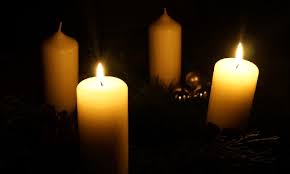Advent is a time to wander down many different pathways to the meet the Christ child. Each week we’re given a new road to meander down that draws us nearer to that sacred space. Each of these pathways is a different opportunity to discover something new about who we are.
So, Where Do We Begin. I suspect it will be different for all of us. That’s okay. Like Emerson said, it’s the journey that matters. It’s taking the first step that leads to the next. With each step forward, we discover life is no longer the same as it used to be. Like a stream, it’s always flowing and always different every second of every moment. What’s important to remember is it’s how we find ourselves and grow closer to God in these steps we take that matter the most. Years ago, I met a man in the city square of Iquitos, a small Peruvian town settled along the Amazon River. It was my first time there, and his first time back since he and two college friends hiked the infamous Inca Trail in the late 70's. I have heard many stories from people who have taken this ancient pilgrimage to the sacred ruins of Machu Picchu. But never had I heard one like his. His story began in a bar where, over a few drinks with the locals, he expressed his desire to see this place which is considered one of the seven greatest marvels of the world, Back then trains didn’t drop you off at the foot of the mountain. And there were no buses to take up to the pilgrimage site. To get there you had to hike the legendary pilgrim trail which is part of the 23,000 kilometers network of pathways that vein through the Andes Mountain range. While these guys were hoping for a guide to show them the way, all they got was a hand-drawn map sketched on the back of a cocktail napkin. Things may have been different in the 70’s, but I’m not sure I would entrust my life to something so vulnerable and susceptible to the elements like a napkin. These guys did. It wasn’t until they watched their train disappeared into the dark wilderness that they questioned their judgement. With no other way out, they took the first step up the steep mountainside. Every step he took was a step into truly the unknown. For five hours they hiked in silence, too scared to talk. Just as he was about to suggest they turn around, they reached the first set of ruins drawn on the napkin. There they set up camp. While sleeping under a canopy of stars that night, he realized this was no longer a trip, but a journey that would forever change him. Our wilderness adventure doesn’t start in a bar, but along the sandy banks of the Jordan River where we meet a man the late Rachel Held Evans described as, “that crazy guy you go out of your way to avoid in the Walmart parking lot.” I like to think of John as that stranger in the bar, giving us a map for our pilgrimage. Anyone who chooses to take this trip needs to pay attention to what he has to say and not be distracted by how crazy it sounds. Because John is leaving us little places to stop and ponder the deeper meaning of life. What he had to say would change the world forever. READ: Matthew 3:1-12 n those days John the Baptist appeared in the wilderness of Judea, proclaiming, “Repent, for the kingdom of heaven has come near.” This is the one of whom the prophet Isaiah spoke when he said, “The voice of one crying out in the wilderness: ‘Prepare the way of the Lord; make his paths straight....“I baptize you with water for repentance, but the one who is coming after me is more powerful than I, and I am not worthy to carry his sandals. He will baptize you with the Holy Spirit and fire.”
Like I said last week, text without context will often get us in trouble. So, here’s what we know.
The son of a temple priest, John was a good Jewish boy who followed his father’s footsteps. At some point, he abandoned the temple for the wilderness where he lived only on what God provided, wild honey and locusts. John also gave up the ceremonial purification pools of the temple in exchange for the wild, flowing waters of the Jordan where he preached a baptism of repentance. Today, we understand repentance as an act of sincere regret. It’s a way to show remorse so forgiveness and healing can happen. Back then, to repent was less about being sorry and more about changing your thinking. The idea is if one begins to think differently, then one will also start to act and live differently. To repent is to have a new mindset, and for Christ followers it helps us to be more aware that our actions are out of step with God’s dream for all creation. We know this because Jesus also began his ministry saying, “Repent for the kingdom of heaven has come near.” Like his cousin, Jesus will dedicate his life to show us how to reconnect with God, by changing the way we look at the world and how we interact in it. To repent is a good place for us to start our pilgrim journey. It reorients our heart and mind to follow God’s will instead of our own. But there’s more to John’s story. He was out in the wild baptizing people because that’s a part of what priest do, they purified and prepared people to enter the temple. You might have been baptized with a little water poured over your head as a baby. Or perhaps full submersion as an adult. Like Richard Rohr notes, "water doesn’t really change a person." It’s just a ritual, an outward sign of an inward promise. John knows water doesn’t change your heart, your mind, or actions. Real baptism, as he points out, comes from Christ who baptizes “with the Holy Spirit and Fire.” Again, this text needs context.
watch it if you don't feel like reading any further
John gives us an allegory, and unless you’ve worked threshing wheat, then you might be tempted to think this is a scare tactic to avoid the eternal fires of hell.
That’s one way of looking at it. A human way which doesn’t seem to fit God’s way. God is not quid pro quo – do this or else. Revenge is not love. And anything that isn’t love isn’t from God. Another way of looking at these verses is to see the fire like a refiner’s fire – one used to cleanse and purify precious metals. Isn’t that what the Holy Spirit does? Like John, it prepares the way for us to meet God by removing our impurities. As the text suggests, the Holy Spirit doesn’t use water. It uses an axe and fire. Again, context is key. In our front yard, we have a tree that has the world’s best avocados. But it doesn’t do it on its own. I water it, prune it, care for it, and give it the attention it needs to produce its delicious fruit. In the same way, it’s the Spirit’s job to prune away the parts of us that no longer bear good fruit in the kingdom of heaven. Those things are tossed into a fire…and transformed into something good for the world, like heat to cook a meal. If we are to bear the fruit of God’s peace, then we need to remove the things that keep us from doing what God has called us to do – which is love one another. We might all start this journey in different phases of life, but we all start from the same place. In the wilderness of life, surrounded by chaos and distractions that try to steal our peace. Out here, we’re constantly being tempted and led astray from God. Although we might know how to read the stars, or forage for food, we can’t rely on our own selves to keep on the right path. We need the Holy Spirit to lead us and guide us in God’s way of seeing, thinking, and doing. St. Paul tells the churches in Galatia to “live by the Spirit and you will not gratify the desires of flesh” (Galatians 5:16) because Paul knew that when we live by the Spirit, we produce the fruits of the Spirit. With the Spirit of Love growing in us, we can produce peace instead of war. Joy instead of sorrow. Kindness instead of hatred. Gentleness instead of pettiness. Self-control instead of rage. We become more patient. More generous. More faithful. John paved the way for Christ who, in all the ways he showed God’s love would change the world forever. It was Christ who gave us the Spirit so we can go and do the same. If we listen with an open heart, we can still hear John’s voice crying out in our wilderness; calling us to wake up and come clean; “to turn around from the old way we do things, so we don’t miss out on seeing the new thing God is doing right before our eyes.” (Taylor) As we wait for the Christ child to break into our world and longing, and redirect our pathway back to the open heart of God, we must remain awake and present to the Spirit of Love, the very presence of Christ within us all. By this Spirit we can tune our ear to the voices crying out for mercy. We can touch the hands in need of human tenderness. We can forgive those who have love inside them but don’t yet know it. As we move through the space we call Anamesa, may we always bear the fruits of the Spirit, walking in-step with the saints who’ve walked this pathway before us – bringing the light of hope and illuminating God’s peace into the darkest corners of the world. Therefore, go and start your journey in whatever space we’re in right now, singing from your heart, “Repent, for the kingdom of heaven has come near.” Work Cited Evans, Rachel Held. Searching for Sunday: Loving, Leaving, and Finding the Church. (Nashville: Nelson, 2015). Rohr, Richard. The Two Tasks. December 14, 2019 (Accessed on December 1, 2022). Taylor, Barbara Brown. Home By Another Way. Rowman & Littlefield, 1999.
0 Comments
Leave a Reply. |
Ian MacdonaldAn ex-copywriter turned punk rock pastor and peacemaker who dedicates his life to making the world a better place for all humanity. "that they all might be one" ~John 17:21“Prius vita quam doctrina.”
~ St. Thomas Aquinas (1225–1274) * “Life is more important than doctrine.”
Archives
June 2024
|

